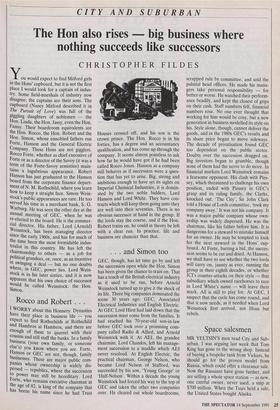. . . and Simon too
GEC, though, has let time go by and left the succession open while the Hon. Simon has been given the chance to train on. That has a touch of the British electrical industry as it used to be run, before Arnold Weinstock turned up to give it the shock of its life. Three big companies dominated the scene 30 years ago: GEC, Associated Electrical Industries and English Electric. At GEC Lord Hirst had laid down that the succession must come from the families. It had reached his 70-year-old son-in-law before GEC took over a promising com- pany called Radio & Allied, and Arnold Weinstock with it. At AEI, the grandee chairman, Lord Chandos, left his manage- ment succession in a muddle which AEI never resolved. At English Electric, the practical chairman, George Nelson, who became Lord Nelson of Stafford, was succeeded by his son, 'Young George' or `Half-Nelson'. Within a decade the young Weinstock had forced his way to the top of GEC and taken the other two companies over. He cleared out whole boardrooms, scrapped rule by committee, and sold the palatial head offices. He made his mana- gers take personal responsibility — for better or worse. He watched their perform- ance beadily, and kept the closest of grips on their cash. Staff numbers fell, financial numbers rose. No one ever thought that working for him would be cosy, but a new generation in business modelled its style on his. Style alone, though, cannot deliver the goods, and in the 1980s GEC's results and its share price began to move sideways.
The decade of privatisation found GEC too dependent on the public sector. Doubts over the succession dragged on.
Big investors began to grumble, though none of them had the nerve to do more. In financial markets Lord Weinstock remains a fearsome opponent. His clash with Ples- sey, which threatened to challenge his own position, ended with Plessey in GEC's grasp and its ruling family, the Clarks, knocked out. 'The City', Sir John Clark told a House of Lords committee, 'took my company away.' It was not his company. It was a major public company whose own- ership was widely dispersed. He was the chairman, like his father before him. It is dangerous for a steward to mistake himself for an owner. He may be tempted to look for the next steward in the Hons' cup- board. At Forte, barring a bid, the succes- sion seems to be cut and dried. At Hanson, we shall have to see whether the two lords will carry on, jaunty as ever, running the group in their eighth decades, or whether ICI's counter-attacks on their style — that subsidiary which owned racehorses to race in Lord White's name — will leave their mark. All is still to play for. At GEC, I suspect that the cycle has come round, and that it now needs, as it needed when Lord Weinstock first arrived, not Hons but rebels.


















































 Previous page
Previous page